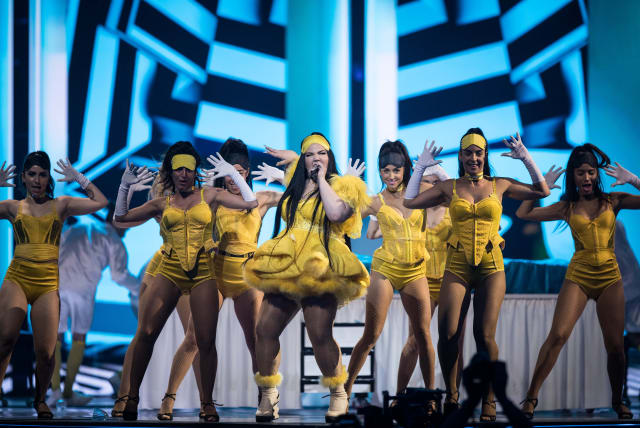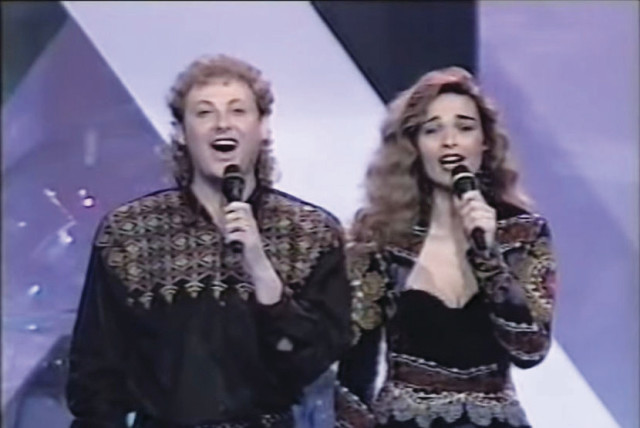Eurovision: The ultimate display of Israeli patriotism

Along with the Olympics and maybe an Israeli film or actor getting nominated for an Oscar, the Eurovision Song Contest is one of the few times that Israelis can feel unabashedly Israeli.
You may think that all those flags that have unfurled from porches and car windows over the last few days are in honor of Independence Day, which will be celebrated next week.
But, in essence, the annual festival of picnics, barbecues, visits to historical sites and hikes in nature are just the opening act for the ultimate display of Israeli patriotism – Eurovision.
You can claim to ignore it or relish in mocking the garish Euro-trashiness of it all, but come on… admit it. When those scores are read out from Liverpool sometime after midnight on May 13, you’ll be biting your nails along with the rest of us as each country hands out their tallies to their three favored songs.
That’s because, along with the Olympics and maybe the rare instance of an Israeli film or actor getting nominated for an Oscar, the Eurovision Song Contest is one of the few times that Israelis can feel unabashedly Israeli, with no strings attached. There’s no Right, Left, judicial reform or dysfunctional governments to consider; there’s only the glorious spectacle over substance, and boa feather costumes over content. That’s something we can all get behind for a night, no matter where we stand on the political map.
“People may say they don’t care, but deep down there’s a lot of pride there,” said Benny Dudkevitch, the veteran Israel Radio culture correspondent who has witnessed decades of Israeli Eurovision participation.
Has glitter and glam taken over Israeli Eurovision entries?
Over the years, he’s seen the Israeli entries transform from the majestic “Hallelujah” to the techno “Toy” and everything in between. The innocence of a rosy-cheeked ABBA or an earnest Gali Atari has long been replaced by glitter and glam, a development Dudkevitch thinks is not necessarily a bad thing.
“Eurovision has gotten more sophisticated. A simple folk song like “Hallelujah” would never get selected today. That time has passed. But it’s been replaced by some exciting styles and innovative approaches,” he said.
But it’s not only the songs that have changed, it’s the stature of Israel that has been bolstered through the years, according to Dudkevitch.
“Israel is a real player in this huge competition, and other countries are focused on what we’re doing,” he said.
That goes for back home, too. Grandmothers and four-year-olds alike are walking around these days humming “I’m gonna stand here like a unicorn” in thick Israeli accents. They’re internalizing the line from the ubiquitous pop anthem of independence by Noa Kirel, Israel’s entry in Eurovision this year.
Like “Toy,” Netta Barzilai’s feminist anthem before it, “Unicorn” is as disposable as it is catchy, and thus a perfect Eurovision song. It could wind up winning as easily as it could plummet to last place, or receive the fate of Israel’s entry last year – grocery stock boy-made-good Michael Ben David’s “I.M.” – and not even get to the finals.
The differences between “Toy,” “I.M.” and “Unicorn”? Not a lot. There’s no way to judge Eurovision entries in the conventional criteria that “serious” music is weighed. Especially in the TikTok era, it all depends on what catches the viewers’ fancy at that particular moment and turns into a social media trend.
Perhaps that’s a reason to eschew the hoopla of Eurovision. But in what other scenario could you ever cheer on someone who’s scantily clad, waving an Israeli flag, and singing in a mixture of English and Hebrew?
If you haven’t embraced the tacky charms of Eurovision, it’s never too late. You may hate yourself while you’re doing it, but in the morning there might be a bounce to your step, and the weight of the country’s woes could feel a little lighter.
And if, by some chance, Israel wins, then, in Noa’s words, “It’s gonna be phenomen-phenomen-phenomenal.”
Jerusalem Post Store
`; document.getElementById("linkPremium").innerHTML = cont; var divWithLink = document.getElementById("premium-link"); if (divWithLink !== null && divWithLink !== 'undefined') { divWithLink.style.border = "solid 1px #cb0f3e"; divWithLink.style.textAlign = "center"; divWithLink.style.marginBottom = "15px"; divWithLink.style.marginTop = "15px"; divWithLink.style.width = "100%"; divWithLink.style.backgroundColor = "#122952"; divWithLink.style.color = "#ffffff"; divWithLink.style.lineHeight = "1.5"; } } (function (v, i) { });

